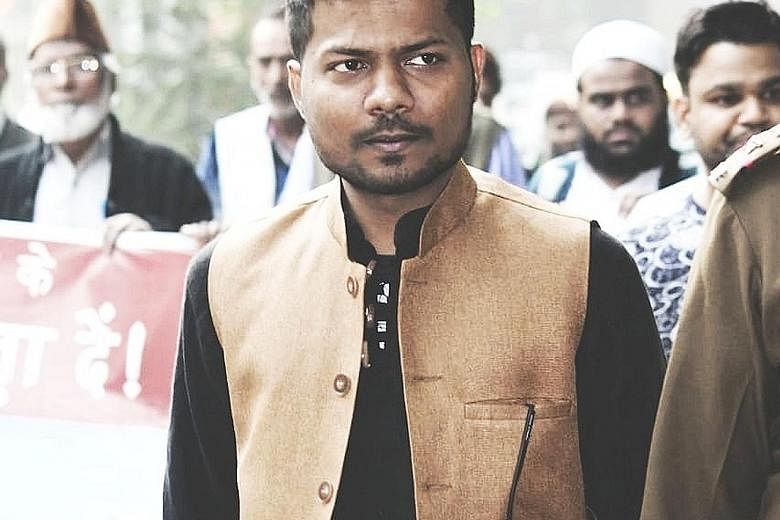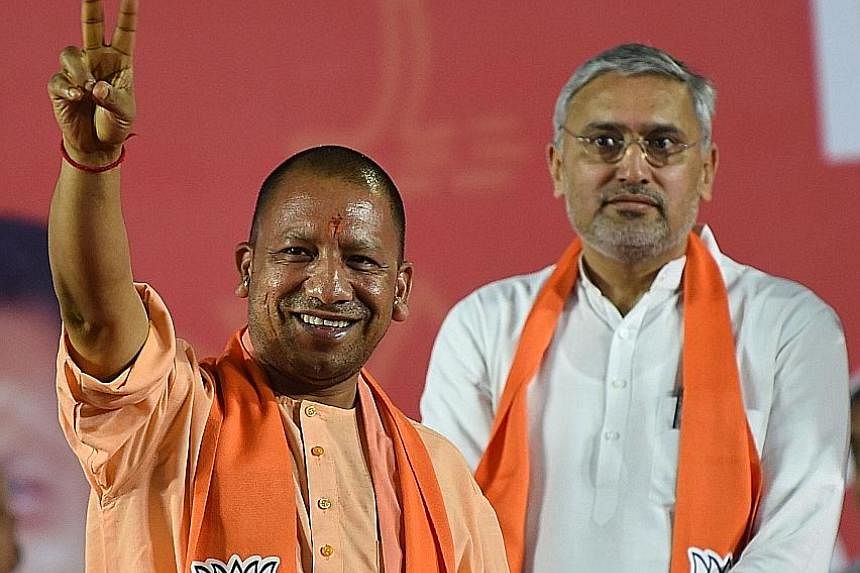A freelance journalist arrested for allegedly defaming the powerful chief minister of Uttar Pradesh is awaiting release after India's Supreme Court ordered that he be freed, amid concern about tightening curbs on free speech.
The lawyer of Mr Prashant Kanojia said that while all procedures had been completed, there was an "inexplicable delay'' over his release.
Mr Kanojia had shared a tweet that contained a video in which a woman claimed to have video chatted with Chief Minister Yogi Adityanath for a year. Ms Hema Saxena also said that she had sent a marriage proposal to Mr Adityanath, a Hindu monk.
Mr Kanojia was arrested at his home in New Delhi last Saturday by police from Uttar Pradesh after he uploaded and commented on the video on Twitter and Facebook.
He was charged with criminal defamation, which carries a maximum sentence of two years' jail.
However, the Supreme Court on Tuesday ordered Uttar Pradesh police to release Mr Kanojia, noting that the arrest was wrong.
"We may disapprove of these tweets but we (also) disapprove of the denial of liberty," said the Supreme Court, which did not go into the details. The case against the journalist continues.
The police have maintained that his comments and the spread of the woman's claims defamed Mr Adityanath, who belongs to the ruling Bharatiya Janata Party (BJP).
Two other journalists - Mr Ishika Singh, head of a private television news channel, and its editor Anuj Shukla - were also arrested for defamation following a discussion on Ms Saxena's comments.
The arrests drew condemnation from many journalists and media groups as an attack on freedom of expression and press freedom.
The Editors' Guild called the police action high-handed and arbitrary, and said it "amounts to an authoritarian misuse of laws".
"It is our firm belief that journalists ought to conduct themselves responsibly, yet at the same time, we feel that criminal provisions of the defamation law should be taken off the statute books, given their repeated use against journalists and others," said a group of media organisations, including the Indian Women's Press Corps, Press Club of India, South Asian Women in the Media and the Press Association.
India has more than 400 news and current affairs channels, as well as dozens of English, Hindi and regional language newspapers and news websites.
The media, known for its aggressive style of journalism, has faced severe challenges in recent years, including increasing reports of intimidation, death threats and trolling.
There is also rising concern that journalists are being targeted by those in power through the use of laws, such as the defamation and sedition legislation, as well as the National Security Act.
India is ranked 140th out of 180 countries in the 2019 World Press Freedom Index, down from 138th last year and 136th in 2017.
"Clearly, therefore, this response of the police is an attempt to intimidate anyone who takes a swipe at those in power," the Indian Express said in an editorial.
"The (Uttar Pradesh) police are doing what is, disturbingly, becoming frequent, evident in the shameful string of arrests of men and women across the country for posting or even forwarding material critical of those in power," it added.
In north-eastern Assam, scholar and award-winning author Hiren Gohain faces charges of sedition for criticising the now-lapsed Citizenship (Amendment) Bill, aimed at allowing non-Muslims from Muslim-majority countries such as Bangladesh to settle in India.
In Manipur, adjacent to Assam, journalist Kishorechand Wangkhem was sentenced to a year's jail under the National Security Act for a Facebook post criticising Chief Minister Nongthombam Biren Singh of the BJP.
Veteran journalist Mrinal Pandey said Mr Kanojia's case was clearly aimed at creating fear among young journalists, especially those writing about people in power.
"It does impact freedom of speech. I am glad all major journalist organisations have condemned it," she added.


